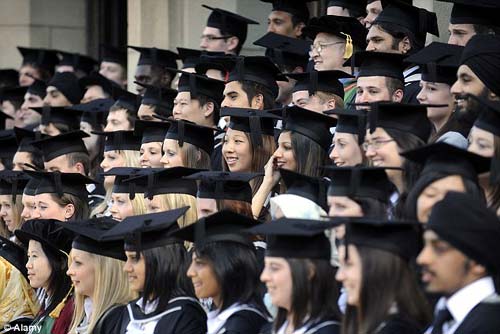
Students wishing to safeguard their careers against changes in the job market should opt for science rather than arts degrees, according to a survey of undergraduates.
一项对本科生的调查显示,希望降低就业风险的学生最好选择读理科专业而非文科专业。
Engineering and chemistry were considered to be the most ‘future proof’, as they are courses most likely to lead to an enduring and adaptable career.
工程学和化学专业的学生最有可能找到一份稳定又容易适应的职业,这两种专业被认为是未来就业的最佳保证。
Students polled by a college were broadly optimistic that their chosen courses would prepare them for a world in which the job market could change dramatically during their working lives.
这项由皮尔森学院(Pearson College)展开的调查显示,大多数受访学生对自己的专业持乐观态度,认为能顺应未来变幻莫测的人才市场。
But opinion was sharply divided over which degrees were best for future-proof careers.
但哪些专业才是未来职业生涯的最佳保证?学生各有观点。
Eighty-two per cent of respondents believed engineering would help develop future-proof skills, with 74 per cent believing the same of chemistry and 73 per cent of computer science.
82%的受访者相信工程学专业有助于培养能抵御未来就业市场变化的“万金油”技能,74%和73%的受访者分别认为化学专业和计算机科学专业可以培养出“万金油”技能。
But just 33 per cent of undergraduates believed history would lead to a future-proof career, and 40 per cent English.
只有33%的大学生相信历史专业能保证未来就业,而40%的大学生选择英语专业。
However more than two thirds of students - 67 per cent - thought the world of work would be significantly different or completely unrecognisable in 20 years.
另外,67%(超过三分之二)的学生认为20年后全球的工作环境将发生翻天覆地的变化。
The findings, published today, come after Education Secretary Nicky Morgan sparked controversy with claims that teenagers should steer clear of the arts and humanities and opt for science or maths subjects if they want to access the widest range of jobs.
这项调查结果发布不久前,英国教育部长尼基·摩根(Nicky Morgan)在2014年11月发表言论称,青少年如果未来想增加就业受聘机会,那么应该避开艺术和人文专业而选择科学或数学专业。这一言论引发诸多争议。
She said that in previous decades students would only take maths or science if they wanted to pursue a specific career such as medicine or pharmacy, but nowadays that ‘couldn’t be further from the truth’.
她说,在过去几十年,只有想从事像医学或药剂学这种特定的职业的学生才会去选择数学或科学专业,现如今这种想法已经“严重和现实脱节”。
‘If you wanted to do something different, or even if you didn’t know what you wanted to do…then the arts and humanities were what you chose. Because they were useful – we were told – for all kinds of jobs. Of course now we know that couldn’t be further from the truth, that the subjects that keep young people’s options open and unlock doors to all sorts of careers are the STEM (science, technology, engineering and maths) subjects.’
“如果你想做点其他的工作,或者还不知道自己想做什么,那么你就会去选艺术或人文学科,因为大家都说它们很有用——行行都受用。但现在我们知道,这种说法根本不符合事实:能灵活选择未来职业、行行都吃香的专业变成自然科学、技术、工程学、数学等理工专业。”
She also described maths as ‘the subject that employers value most’ and said that pupils who study A-level maths will earn 10 per cent more over their lifetime.
她同时也认为数学是“雇主最看重的专业”。学生如果通过高深级(英国中等教育高级水平课程)数学考试,一辈子能多挣10%的薪水。
‘These figures show us that too many young people are making choices aged 15 which will hold them back for the rest of their lives,’ she said.
“这些数字告诉我们,有太多年轻人在15岁就做出了会阻碍自己一生发展的决定。”